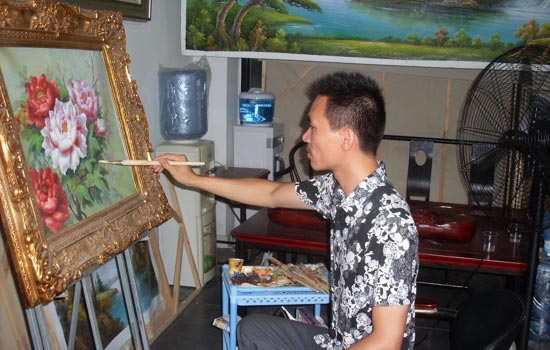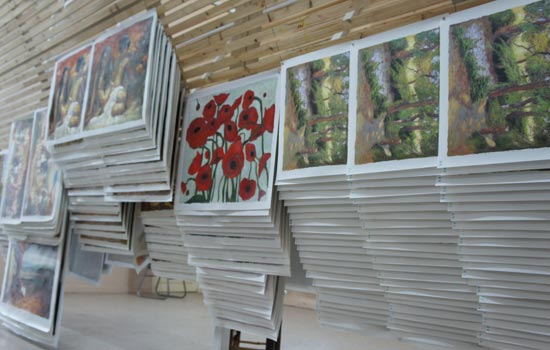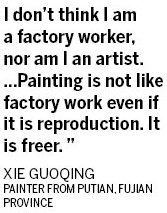Oil painter's brush with success
Updated: 2012-08-17 11:03
By Chen Limin in Putian, Fujian (China Daily)
|
||||||||
Artist switches from creating reproductions to taking part in exhibitions
Holding a paintbrush is as natural as using chopsticks for Xie Guoqing.
His familiarity with painting began 16 years ago when he served as an apprentice to a skilled artist in Putian in East China's Fujian province, the home of tens of thousands of oil painters like 32-year-old Xie.
|
 |
|
Xie Guoqing made about 300 yuan ($47) a month when he began as an apprentice painter 16 years ago. Today, he owns his own studio in Putian, Fujian province. [Photo / China Daily] |
"It was like working at a factory in the very beginning," he said, recollecting the early days when he studied art for 15 to 16 hours a day.
He paid 3,000 yuan ($471) for a year's tuition and then spent his days next to his teacher, observing everything he painted, and trying his hand at the easiest paintings.
"As you see more, you have a sense of what it is all about," he said.
His salary increased as he grasped the basic skills of oil painting. By tackling the orders his teacher assigned, he earned 300 yuan a month at the beginning of the second year, which jumped to 3,000 yuan by the end of the third year, when he could handle relatively complex works.
An oil painter could earn 10 times the salary of a junior high school teacher in Putian when the market was thriving in the 1990s.
Some of Xie's fellow painters were even shyly approached by young women for marriage, as they preferred their prospective husbands to be in the profession.
Xie's wife is an oil painter, too. Painting is almost his "family business" as another six of his relatives have also taken up the paintbrush.
Following a three-year apprenticeship, he left his teacher to work on his own, which was a common practice for young painters.
|
 |
|
Reproductions at an art studio in Putian, Fujian province. [Photo / China Daily] |
Most of his early work was commercial painting, but he has started to paint original works in recent years as the market has become more demanding and greater importance has been attached to creative works. "I don't think I am a factory worker, nor am I an artist," he said, explaining that his work seem to be somewhere in between. "Painting is not like factory work even if it is reproduction. It is freer. But I am not that obsessed with art either."
At Xie's studio, which has six apprentices and four painters, an ordinary apprentice-level replica is sold to a dealer for about 100 yuan, while a higher level commercial painting that incorporates the painter's own creativity can cost 1,000 yuan. Completely original works are priced at about 5,000 yuan.
|
|
 |
"It (painting) cannot provide you with a big fortune, but you can live on it," he said.
And for him, there are bonuses in this line of work. Improving his skills, taking part in exhibitions, and getting awards from time to time give him a sense of satisfaction.
He is currently busy with an original work, aiming to take it to a provincial art exhibition.
"I've had my works exhibited twice there. One more time and I will get the title of provincial painter," he said.
While he likes his oil paintings to be shown to others, he doesn't have a single one hung in his own house, where all of the works on display are by other painters.
"I never do that," he said. "When you look back to your paintings in the past, you will find something you don't like. You are never satisfied."
chenlimin@chinadaily.com
- Painting a richer picture for China's culturally aware
- From concept to action: Painting the office green
- Small city looks at the big picture
- West Lake inspires art and lifestyle
- China holds on to its top billing for art revenues
- China annually exports ceramic art worth $1.5b
- Art market sees a different picture

 Relief reaches isolated village
Relief reaches isolated village
 Rainfall poses new threats to quake-hit region
Rainfall poses new threats to quake-hit region
 Funerals begin for Boston bombing victims
Funerals begin for Boston bombing victims
 Quake takeaway from China's Air Force
Quake takeaway from China's Air Force
 Obama celebrates young inventors at science fair
Obama celebrates young inventors at science fair
 Earth Day marked around the world
Earth Day marked around the world
 Volunteer team helping students find sense of normalcy
Volunteer team helping students find sense of normalcy
 Ethnic groups quick to join rescue efforts
Ethnic groups quick to join rescue efforts
Most Viewed
Editor's Picks

|

|

|

|

|

|
Today's Top News
Health new priority for quake zone
Xi meets US top military officer
Japan's boats driven out of Diaoyu
China mulls online shopping legislation
Bird flu death toll rises to 22
Putin appoints new ambassador to China
Japanese ships blocked from Diaoyu Islands
Inspired by Guan, more Chinese pick up golf
US Weekly

|

|







